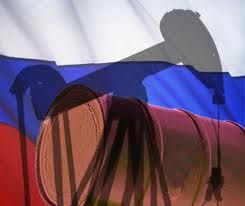
Russian leaders hailed their powerful energy industry on Sunday as the country posted a post-Soviet record high rate of oil production that should boost coffers in uncertain global economic times.
The energy ministry said private and state companies extracted a combined 10.38 million barrels per day in August - only a slight increase over July but higher than any figure seen in the past two decades.
Nearly a quarter of the oil was produced by the government's expanding Rosneft unit that last year struck Russia's first Arctic exploration agreement with the US super-major ExxonMobil.
Analysts said production is rising as companies seek to take full advantage of strong global oil prices before a potential hit from the impact of a mooted Greek withdrawal from the eurozone in the months to come.
But the news is especially welcome for a budget that earned 49 percent of its revenues from oil and gas sales in 2011 and will now hope for output to meet President Vladimir Putin's big spending promises for his third term.
Prime Minister Dmitry Medvedev said the country had assumed its "rightful place" as the world's largest combined exporter of oil and natural gas.
But "it is important to keep moving ahead along the path of innovation," Medvedev also cautioned. "We have to adopt advanced, science-intensive technology and improve labour production."
Russia claimed the world's top oil production rate last year but now closely trails Saudi Arabia because it lacks the resources to quickly step up output at times of rising prices.
It is still the globe's top natural gas exporter thanks to Gazprom - a state behemoth now facing headwinds because of its failure to tap exploding liquefied natural and shale gas markets in time.
Data showed natural gas production shrinking by 3.3 percent between January and August.
The downbeat figure largely reflect the reality that almost all of Gazprom's foreign sales are focused on European and post-Soviet countries that are currently experiencing some of the slowest growth rates in the world.
Energy Minister Alexander Novak said the sector as a whole accounted for 30 percent of gross domestic product and was "developing successfully and at a stable rate" despite the problems at Gazprom.
But the minister also pointed to necessary improvements to a tax policy that often fails to reward investment and appears to focus on revenues rather private firms' strategic growth.
"The first thing we need to do is improve our tax regulations," Novak said in a statement.
Analysts agreed that Putin's focus on revenues and desire to meet post-March election spending promises that include a record but disputed new rearmament programme threatened to hurt the country in the decades to come.
"The authorities are staking everything on filling the budget," National Energy Institute director Sergei Pravosudov told the Prime business news agency.
"They should be making decision based on development," he said.
The $710 billion earmarked for the military this decade - a sentimental choice boosting Putin's tough image - sparked bitter arguments that has cost the job of Russia's veteran and widely admired finance chief Alexei Kudrin.
But Putin last week again promised to "modernise our defence industry as comprehensively as it was done in the 1930s" in the worst years of Stalin's repressions.
Source: AFP
We use cookies to improve your experience. By continuing to use our site, you accept our Cookies, Privacy Policy,Terms and Conditions. Close X